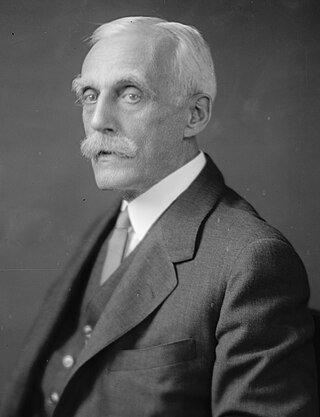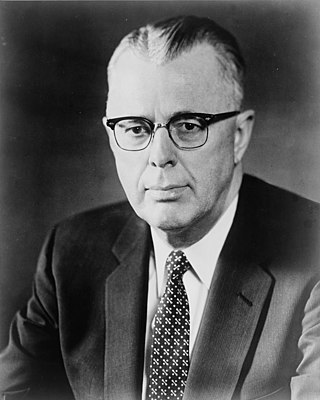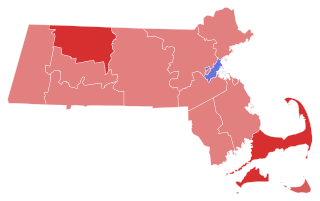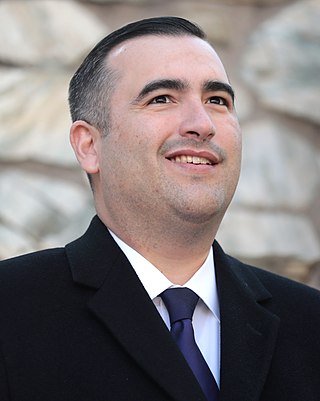Related Research Articles

Calvin Coolidge was the 30th president of the United States, serving from 1923 to 1929. A Republican lawyer from Massachusetts, he previously served as the 29th vice president from 1921 to 1923 and as the 48th governor of Massachusetts from 1919 to 1921. Elected vice president in 1920, he succeeded to the presidency upon the sudden death of President Warren G. Harding in August 1923. Elected in his own right in 1924, Coolidge gained a reputation as a small-government conservative with a taciturn personality and dry sense of humor that earned him the nickname "Silent Cal". His widespread popularity enabled him to run for a second full term, but Coolidge chose not to run again in 1928, remarking that ten years as president would be "longer than any other man has had it—too long!"

The 1924 United States presidential election was the 35th quadrennial presidential election, held on Tuesday, November 4, 1924. In a threeway contest, incumbent Republican President Calvin Coolidge won election to a full term. Coolidge was the second vice president, after Theodore Roosevelt, to ascend to the presidency and then win a full term.

Andrew William Mellon, known also as A. W. Mellon, was an American banker, businessman, industrialist, philanthropist, art collector, and politician. The son of Mellon family patriarch Thomas Mellon, he established a vast business empire before moving into politics. He served as United States Secretary of the Treasury from March 9, 1921, to February 12, 1932, presiding over the boom years of the 1920s and the Wall Street Crash of 1929. A conservative Republican, Mellon favored policies that reduced taxation and the national debt of the United States in the aftermath of World War I. Mellon also helped fund and manage Kennywood Park in West Mifflin, Pennsylvania.

This section of the timeline of United States history concern events from 1900 to 1929.

Rita Coolidge is an American recording artist. During the 1970s and 1980s, her songs were on Billboard magazine's pop, country, adult contemporary, and jazz charts, and she won two Grammy Awards with fellow musician and then-husband Kris Kristofferson. Her recordings include "(Your Love Keeps Lifting Me) Higher and Higher," "We're All Alone", "I'd Rather Leave While I'm in Love", and the theme song for the 1983 James Bond film Octopussy: "All Time High".

Norris Henry Cotton was an American politician from the state of New Hampshire. A member of the Republican Party, he served as a U.S. Representative and subsequently as a U.S. Senator.

The United States Revenue Act of 1926, 44 Stat. 9, reduced inheritance and personal income taxes, cancelled many excise imposts, eliminated the gift tax and ended public access to federal income tax returns.

Jennifer Coolidge is an American actress. Known for her work in the comedy genre, Coolidge is the recipient of several accolades, including a Golden Globe Award and two Primetime Emmy Awards. In 2023, she was included in the annual Time 100 list of the most influential people in the world.
On February 19, 1862, the 37th United States Congress passed An Act to Prohibit the "Coolie Trade" by American Citizens in American Vessels. The act, which would be called the Anti-Coolie Act of 1862 in short, was passed by the California State Legislature in an attempt to appease rising anger among white laborers about salary competition created by the influx of Chinese immigrants at the height of the California Gold Rush. The act sought to protect white laborers by imposing a monthly tax on Chinese immigrants seeking to do business in the state of California.

SS President Coolidge was an American luxury ocean liner that was completed in 1931. She was operated by Dollar Steamship Lines until 1938, and then by American President Lines until 1941. She served as a troopship from December 1941 until October 1942, when she was sunk by mines in Espiritu Santo in the New Hebrides at the Espiritu Santo Naval Base, part of current-day Vanuatu. President Coolidge had a sister ship, SS President Hoover, completed in 1930 and lost when she ran aground in a typhoon in 1937.

The first inauguration of Calvin Coolidge as the 30th president of the United States was held on Friday, August 3, 1923, at the Coolidge Homestead in Plymouth Notch, Vermont, following the death of President Warren G. Harding the previous evening. The inauguration – the sixth non-scheduled, extraordinary inauguration to ever take place – marked the commencement of the first term of Calvin Coolidge as president. The presidential oath of office was administered to the new president by his father, John Calvin Coolidge Sr., who was a Vermont notary public and justice of the peace. On Tuesday, August 21, 1923, President Coolidge repeated the oath before Justice Adolph A. Hoehling Jr. of the Court of the District of Columbia at the Willard Hotel, Washington, D.C.

The following events occurred in February 1927:

The Public Buildings Act of 1926, also known as the Elliot–Fernald Act, was a statute which governed the construction of federal buildings throughout the United States, and authorized funding for this construction. Its primary sponsor in the House of Representatives was Representative Richard N. Elliott of Indiana, and its primary sponsor in the Senate was Bert M. Fernald of Maine (who served on the Senate Committee on Public Buildings and Grounds.

The United States Senate election of 1924 in Massachusetts was held on November 4, 1924. Incumbent Democratic Senator David I. Walsh, first elected in 1918, ran for a second term in office but was defeated by the Republican nominee incumbent Speaker of the U.S. House Frederick H. Gillett. Despite winning 13 out of 14 counties in the state, Gillett was only able to win a narrow margin of 1.7%, which was largely due to Walsh's strong performance in Suffolk County, home to the state capitol of Boston, likely being carried over by fellow Republican Calvin Coolidge's strong performance in the 1924 United States presidential election.

The Increased Penalties Act was a bill that increased the penalties for violating prohibition. Enacted on March 2, 1929, it is also called the "Jones–Stalker Act" or the "Jones Act". The legislation was sponsored by two Republicans, Sen. Wesley L. Jones of Washington and Rep. Gale H. Stalker of upstate New York State. It stipulated that wherever any penalty was prescribed for the illegal manufacture, sale, transportation, importation, or exportation of intoxicating liquor as defined in the Volstead Act of 1919, the penalty imposed for each such offense should be a fine not to exceed $10,000 or imprisonment not to exceed five years, or both. The Act did not repeal any minimum penalties then prescribed by law. It further declared that it was the intent of Congress that the courts, in sentencing offenders, "should discriminate between casual or slight violations and habitual sales of intoxicating liquor, or attempts to commercialize violations of the law."

Thomas Ray "T. J." Shope Jr. is an American Republican politician and businessman who has been a member of the Arizona Legislature from the 16th Legislative District, which covers central and eastern Pinal County and southern Gila County. First elected to the Arizona House of Representatives in 2012, he was a member of the House from January 2013 to January 2021; in the latter part of his time in the state House, he was Speaker Pro Tempore. Shope was elected to the Arizona State Senate in November 2020, and took office in January 2021.

The United States Sesquicentennial coin issue consisted of a commemorative half dollar and quarter eagle struck in 1926 at the Philadelphia Mint for the 150th anniversary of American independence. The obverse of the half dollar features portraits of the first president, George Washington, and the president in 1926, Calvin Coolidge, making it the only American coin to depict a president in his lifetime.

Calvin Coolidge's tenure as the 30th president of the United States began on August 2, 1923, when Coolidge became president upon Warren G. Harding's death, and ended on March 4, 1929. A Republican from Massachusetts, Coolidge had been vice president for 2 years, 151 days when he succeeded to the presidency upon the sudden death of Harding. Elected to a full four–year term in 1924, Coolidge gained a reputation as a small-government conservative. Coolidge was succeeded by former Secretary of Commerce Herbert Hoover after the 1928 presidential election.
The presidency of Calvin Coolidge began on August 2, 1923, when Calvin Coolidge became the 30th president of the United States upon the sudden death of Warren G. Harding, and ended on March 4, 1929.
References
- ↑ Pietrusza, David (22 January 2013). Coolidge: A Documentary Biography. Church & Reid Books. p. 406. ISBN 978-1-4680-1777-9.